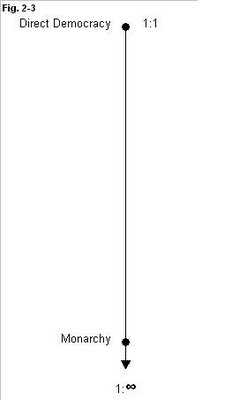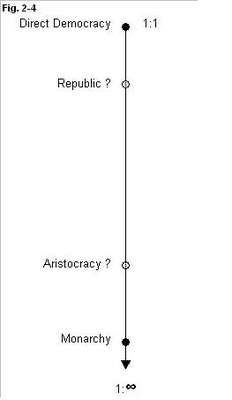This post is likely to offend some. I hope it does. I find the dishonesty in the discourse about this topic to be so offensive, that some ruffling of the feathers is warranted.
I had just finished an investigation at the Holocaust Museum in the US. It was both an interesting historical look, as well as a somewhat personal look, into the administration of Germany by occupying US forces after the fall of Berlin. My grandfather was a senior JAG officer in the occupation, so part of my work included looking for clues about him. I won't share what I found, except to say that the documentation of the Holocaust, when examined from the cold, historical record used as evidence at Nuremburg, was truly heartbreaking. With each turn of the dusty page, my sense of what humanity was changed irrevocably. We aren't the wondrous Mankind which the Muses sang about and
the Poet recorded, at least, thats only half the story. My colleague actually had a crisis of sorts. At one point he confessed, as he thought, that his grandparents were German and he had no idea that the German people could be this horrible. He missed the point, we're all German.
Shortly after that gut wrenching study, and during my own continued research into the history of the American Plains Indians, I accompanied an American delegation of political dignitaries visiting Israel. It was my first trip to Israel, though I of course had read plenty about the biblical land, and obviously knew much about the land as it had been shaped by modern war. We deplaned and were whisked off to a waiting lounge at the airport for VIPs. It was loaded with the best breakfast foods I had ever eaten (or at least, the long flight made it seem that way).
A hunkety hunk from the MFA (Ministry of Foreign Affairs) greeted us when we arrived. She was incredibly good looking and incredibly professional, as were almost all of the high-ranking Israeli officials I met with. Both men and women, were sharp, well-dressed, extremely intelligent, and capable of indulging in conversation. Their professionalism was truly admirable, I wish our government showed this sort of face to this world. A lot of problems would go away then.
That was why it was so surprising to meet our personal tour guide. Hand picked to accompany the American delegation us and answer all our questions about the land. He had metallic silver hair cut in a tight crew cut. His sun wrinkled skin was deep bronze. The silver hair on his arms glistened as if coated in olive oil. He wore Ray Ban aviators, and reminded me of many of the deep sea fishing boat guides I had seen operating off the coast of North Carolina. His dress was casual, white pants and an open linen shirt showing off his old chest hair. No chains though. He could have been from New Jersey or Florida had he wore some gold. But he was from Israel, he proudly boasted.
Later on in the trip, I realized why he had been paired with the Americans. First of all, he had family in New Jersey and in Florida. His daughter was going to school in New York. He was able to relate to us. But most importantly, he was a veteran. He reminded me much of any WW-II vet in the states. Proud of his accomplishments. He often bellowed: "they call it the six days war in America, but I can tell you the truth is it lasted for over a year." What he meant, as I later learned after having a few drinks with him, he was paratrooper in Operation Shredder (the 1966 attack on Jordanian troops in the West Bank at Samu). In fact, he had been part of the force that blew up a girl's orphanage, though he referred to it as a safe-house for guerrillas. His CO, Col. Shaham was killed in the battle. For him the six days war started then.
But this isn't the point of my post. The point is to relay how many times, and in how many ways, the Palestinian people were degraded, disrespected, and dehumanized by our "tour guide". After traveling through the wondrous modern city of Tel Aviv, we headed to the equally fabulous King David hotel in Jerusalem. For several days we attended conferences with leaders like Shimon Peres. I got to meet with Ehud Olmert in person and have a somewhat lengthy discussion, after which, he told me I was too "intellectually aggressive." We had not seen nor heard a peep out of a Palestinian. Then, one day before we were to head to the Temple Mount and have a guided tour of the Dome of the Rock, we drove through what in American words would be described as a "slum."
In Israeli words, it was described to us as "a nice Palestinian neighborhood." There was garbage piled up on the street. It was dusty. Our bus had "just happened through the area", but it was clear to me this was a setup from the beginning. A former US Mayor, and official in the Clinton Administration, called it too, he leaned over "next they're gonna show us some police line ups".
We saw well-armed Israeli troops questioning a Palestinian woman with child in tow. And we were told by our veteran tour guide: "crime here is always a problem. They just don't know how to govern themselves. The schools and hospitals are always worn out and underfunded because their politicians are so corrupt." Etc. etc. It went on and on for what felt like an hour, but in truth was only about ten or fifteen minutes.
I imagined that similar trips made by similar delegations to the Great Plains after the Civil War ended with similar "tours" through Indian Reservations. "See them all huddled up there, they just prefer to live outside in the cold. They can't be civilized."
Later on in the trip I was able to meet with the city council of Bethlehem. There hadn't been free elections there since 1976. So the council was old, grey, and tired. Several of the politicians were animated. But one of them just sat there, staring at the wall, twiddling with his prayer beads. He saw me notice them, and gave them to me without so much as a word. He returned to his chair, and wall staring.
To be sure, at some Palestinian stops (half of which were cancelled) we met the "victim" game full force. It was truly pathetic, and a waste of time. We got some first hand accounts of Jewish settlers on the West Bank, how they felt like they may be abandoned. And we heard from Jericho residents how they felt like they were giving birth to a long overdue baby. But we also met people like that Bethlehem pol who had probably been staring at that wall for almost 20 years. Just staring. Always remembering his manners, but nevertheless, not much else to do. Then, the other day, I read from what is an otherwise and entertaining and often insightful blog,
the following:
No, the enemy is not "intransigence" ,but rather visceral hatred generated by Jihadist extremism. To this day, unbridled hatred of Israelis is taught in Palestinian schools. Sharon has taken genuine physical and political risks for peace. It is time that Palestinian Authority Chairman Mahmoud Abbas actually cracks down on extremists in his midst.
When people like the Bull Moose make one-sided statements about the conflict between Israel and Palestine, I recall that similar Cherubs cried "savage" whenever Native Americans attacked a camp or a settlement in the Old West. Most of them had never passed the Mississippi. And the few that had saw an isolated, "tour guided" view of the world. They never saw the wild for what it was. They never understood that our "savage" was their "nobility". Honor cannot transcend the lenses of politics.
Luckily, we know that "savage" or "jihadi" or whatever the word of the day is, it reflects dueling realities... it is and is not. This Hegelian truth may often be obscure, but deep in our hearts, we know it to be true. We are all "German", whether we like it or not. And while we have yet to summon the courageous thinkers who will sublate this opposition, one thing is for sure: the Moose will not be among them.






